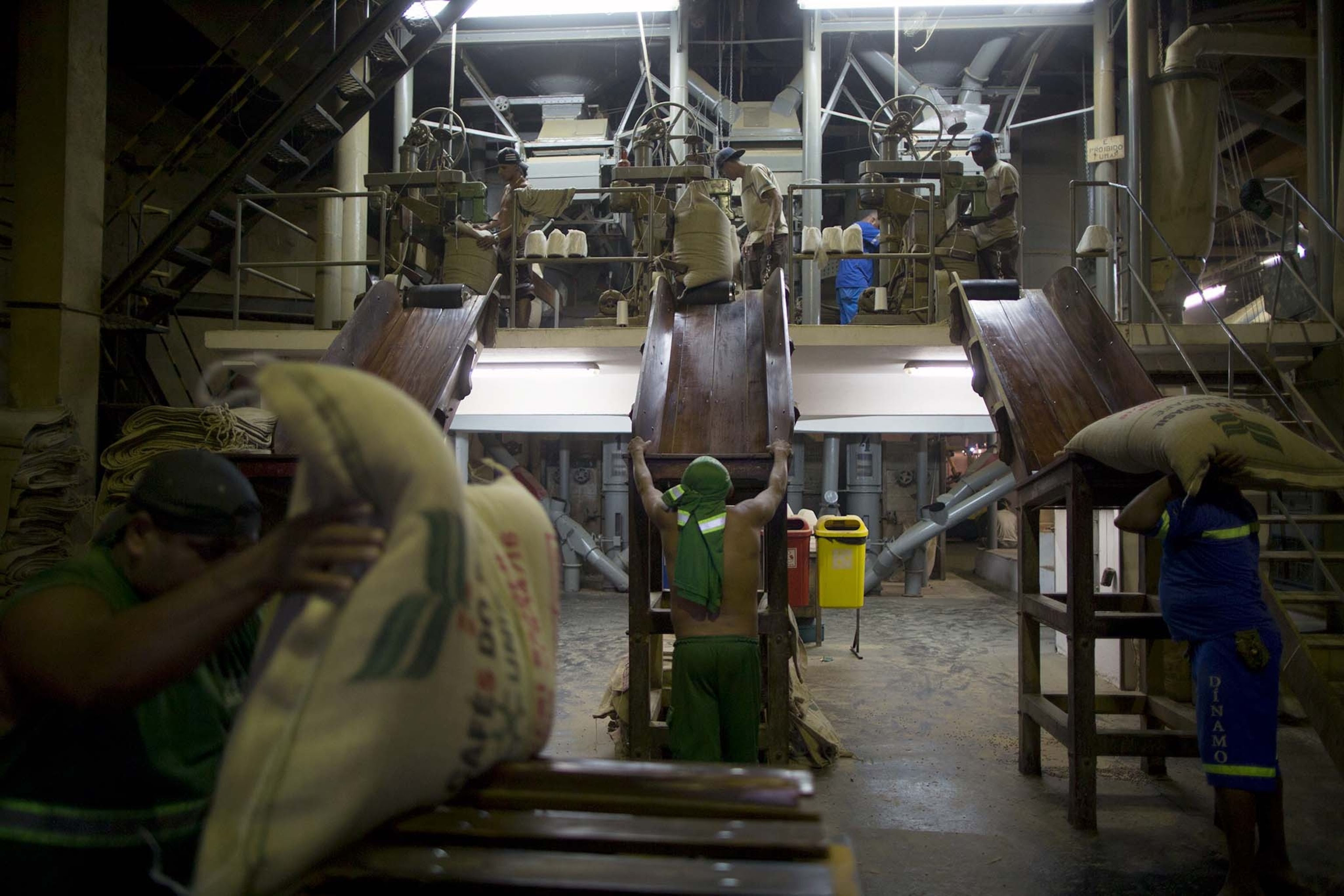
Too Hot for Coffee
Brazil produces most of the planet’s coffee. Amid a drought and a reduced supply, can humanity still get its fix?
According to legend, coffee was discovered not by humans but by goats. An Ethiopian goatherd sometime in the ninth century saw his flock eating berries from a strange tree. He noticed that the berries kept the goats awake at night, full of energy. When he complained to a group of monks, they realized that if they brewed the fruit’s seeds into a hot drink, they too could stay awake to pray.
Humans had long used plants to their advantage. Rice cultivation came 3,000 years before Jesus, and corn not long after. It’s no wonder that coffee spread quickly, first through Egypt and then Yemen. More than 800 years after its apocryphal discovery, the beverage made its way to India, and eventually to Europe, where the church proclaimed it a holy drink. It wasn’t until the 1720s, while Britain was setting up its Colonies in North America, that coffee began to move to South America, where today more grows than anywhere else.
Coffee isn’t actually a bean; it’s the seed of a sweet fruit called a cherry. Chew through the fruit, and you get the seeds. Chew through those too, and you get the same burst of caffeine as you would with the brew. People drink coffee in every country, mostly in the morning but unconfined by a schedule. Coffee as the world’s favorite beverage is surpassed by only one other drink, and that’s just because India and China each have a billion tea-loving people.

For 40 years José Carlos has grown a small portion of the world’s coffee. His farm is in Pinhal, a small town not far from the mountains in south Minas Gerais, the Napa Valley of coffee with the perfect climatic recipe to grow beans: cool summers, warm winters, and heavy moisture to keep the plump berries from drying out. Coffee is a perennial crop that grows year-round in two forms. There are heavy harvests and light harvests, but there is no off-season.
Carlos runs a farm called Satana that ships coffee all over the world, maybe even to your local Starbucks. He grows arabica coffee and turns his nose up at the other, bitterer variety, robusta. This past January he and about 250,000 other small farmers experienced stress when the midsummer rains of the Southern Hemisphere simply didn’t come. Forecasters called it one of Brazil’s worst droughts in decades. Major companies that can troubleshoot the results of bad weather operate a small fraction of Brazil’s coffee farms. Farmers like Carlos without fancy irrigation systems tend the majority—about 70 percent—of the coffee the world receives. “It was bad for the farm and the coffee,” he said through an interpreter. “There weren’t many things we could do.”
In Brazil’s coffee community, people started whispering about a crise, a coffee crisis. Each year Brazil fills 55 million bags of coffee for the world. With January’s drought (which extended into February and then March), the number dropped by 20 percent. Brazil will be lucky to fill 45 million bags. A shortfall of ten million bags—each weighing 132 pounds—translates to around 42 billion cups of coffee that will never be brewed.
While Brazil’s farmers and exporters were biting their nails, caffeinated traders in New York watched the price of coffee rise. Coffee, like oil, is traded on the New York Stock Exchange based on the daily supply coming out of other producers like Vietnam and Colombia. With reduced supply in Brazil, the cost was going from $1.20 per pound to $1.50. It kept rising until it hit almost $2.20. High commodity prices are usually good for producers: Just ask OPEC. But this meant farmers in Brazil could be undercut by their counterparts abroad. Simply to cover their costs, they’d have to sell at a loss.

An unreliable crop also makes buyers flee. In February, Starbucks, the giant of coffee retail, announced it would halt some purchases from Brazil. The company said that to insulate itself from wild price swings in the future, it was starting its own farm to test whether it could grow coffee rather than just buy it. The farm was set up last year in Costa Rica, far away from volatile Brazil.
No one has ever died from lack of coffee, despite how many people—on any given morning—claim the contrary. The drink isn’t even technically a food. But it’s considered by the World Bank to be a commodity of great importance and a poster crop for the effects of climate change on the planet’s food supply. In 2012 a study from the U.K.’s Royal Botanic Gardens and the Environment and Coffee Forest Forum in Ethiopia reported that 70 percent of the world’s coffee supply might disappear by 2080 due to climate change.
All crops are expected to head into periods of extremes. Three months after Brazil’s drought, meteorologists forecast an epic deluge that may prove even more damaging. The problem of drought is dwarfed by the challenges of uncertainty. “In the long run, coffee is becoming very complicated,” says João Staut, a modern coffee baron in the Pinhal region of São Paulo state. He once farmed, and he now helps farmers reach peak quality to attract high prices from overseas buyers. “I think we have entered a very strange period for coffee. We have the tools to keep up with demand, but it will not be easy.”
Farming, in Staut’s words, is a pain—which is hardly breaking news to anyone who has risen at 4 a.m. to plow the land and then pray for rain that never arrived. The business is risky; the living is uncertain; you’re always exposed. Agricultural subsidies usually exist for some historic reason. To make coffee slightly more complicated, the tree needs heavy sunlight for photosynthesis but cool and consistent temperatures so its berries don't parch. In its 2014 report on the planet’s future, the United Nations Intergovernmental Panel on Climate Change said that the combination of weather needed for coffee to grow would be the rarest to find as the planet changes.

There’s only so much that José Carlos, the farmer from Pinhal, can do. “I may try to plant more large trees in the middle of my coffee rows to create more shade,” he told us one day last month. Practicing no-till farming that leaves vegetation on the ground also helps the soil retain moisture. Carlos uses weed killers on his crop, but without genetically modified coffee trees that have resistance to industrial pesticides, he risks killing the trees as well.
Large agribusiness firms that help small farmers grow coffee aren’t ready to give up. But better coffee isn’t easy. Crops like soybeans and corn can come from better seeds, sometimes created by tweaking their genes. Hardier coffee has to come from better roots. The firms that help smaller farmers have poured millions into developing roots for coffee trees that grow deeper and rely less on surface water.
In north São Paulo state, the part of Brazil that ships the most coffee to the rest of the world, we followed the coffee chain. With such small pockets of production, everyone knows someone who grows coffee. Around central Brazil, one farmer said, growing coffee is the only industry that makes financial sense.
We met Gleidson Patto, a coffee cost analyst for the equipment company Pinhalense, which sells equipment to small-scale farmers. The business is highly dependent on those farmers’ succeeding, so it follows the daily movement of coffee futures. While standing on a hill overlooking rolling hills of coffee, I asked him how coffee would change. But what I was really getting at was whether Brazil would be able to keep up.
Where’s the best coffee in Brazil? Dan and Spencer investigate.
His short answer was yes. The longer answer was that the world might soon be inundated with cheap, low-quality coffee. Open flatland that covers most of Brazil could be converted into coffee fields to pump out a cash crop. The cool mountains where coffee grows best would be used for higher quality coffee that would command higher prices. Your future macchiato might not be more expensive, but it might not be as delicious either.
At the same time, the rarity of finding high-quality coffee will only heighten the treat of having a good cup. Like wine, coffee has terroir, the unique characteristics determined by its soil, climate, and overall growing conditions. Taste different types of coffee side by side and you can find subtleties native to a specific region.
In São Paulo’s hipster Vila Madalena neighborhood, longtime barista Isabela Raposeiras is trying to reinvent coffee, or at least people’s experiences with it. Her café is aptly called Coffee Lab and features different “rituals” to help you spot the difference between, say, the same coffee grown in two different places.
When it’s brewed fresh and without fancy machines, coffee has raw character. I’ve long been a tea drinker, but Coffee Lab’s coffee was unlike anything I had ever tasted. Hints of grapes and brown sugar made the raw beverage actually taste sweet. After four cups, as I was losing focus, our barista brought over one more sample to try. The coffee was grown in south Minas Gerais, the area particularly affected by the turn in climate.
The best coffee is prepared with finesse: never overdone and not tampered with, he explained to me in English far better than my Portuguese. He stirred with one clockwise motion, then put the spoon down as if he were playing the final note of a piece on a piano. This last cup tasted more like tomato soup. It was intense and subtle, potent yet not bitter. I bought a bag. Coffee somehow finds a way to surprise.